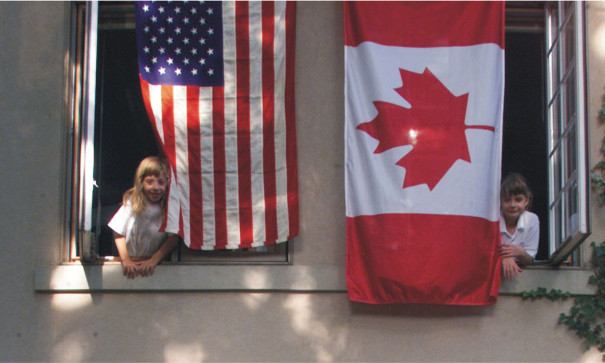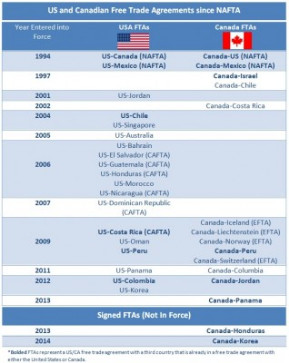
The Secret Trade Contest in North America

Courtesy Government of Canada
Just two days ago, Canada celebrated its first ever trade deal in the Asian region, hooking up with South Korea to eventually abolish tariffs on 98% of all goods between the two economies. For Canadian Prime Minister Harper, it’s a clear attempt to chip away at Canada’s heavy reliance on US import and export markets—roughly 50% of Canadian imports originate in the US, while roughly 75% of Canadian exports are destined for the land of the free. But taking a step back, Canada’s new FTA with Korea is also symbolic of a two-decade-long contest with the US to see who can capture more of foreign markets for themselves.
Of course, it’s a bold claim to say NAFTA’s biggest teammates are at odds with each other; No one will blink when mentioning a US-China currency war, but it’s a completely different matter to talk about a struggle between the two countries that boast the world’s largest bilateral trade flow. So have I drunk the proverbial Kool-Aid of free trade’s greatest critics?
It would seem not. From the birth of NAFTA to the launch of TPP negotiations, the US and Canada’s respective trade agendas have involved successive games of follow the leader. The US FTA with Israel was replicated by Canada’s own Israeli FTA in 1997. In reverse, the US-Chile FTA in 2004 was the mimicking of Canada’s 1997 version. Soon came twin agreements with Peru, then Colombia, and so on (see table).
Such a trend signals how the US and Canada have been vying with each other for foreign markets in a tit-for-tat fashion. And in this contest, FTAs have been the weapon of choice. For those unfamiliar with the potential downsides of bilateral free trade agreements, FTAs can often divert trade away from countries outside of the agreement. This is simply because non-parties are now subject to relatively higher tariffs, even if they happen to be more efficient in producing a good.
Long story short then—the US and Canada know they better be quick to pull the trigger on free trade agreements before the other side moves first. And if one country signs on before the other, better to join in late than never.
The optimist in you may still say that the reason the US and Canada mirror each other so closely is that they’re just similar countries with similar allies. Perhaps this is true to an extent, but the recent Canada-Korea agreement has unfolded with explicit mentions of the US-Korea FTA (KORUS).
The Canadian Press reports:
“Supporters of the agreement have argued that it was critical for Canada to conclude the talks quickly given the competitive advantage enjoyed by the U.S., Europe and Australia from having implemented trade pacts with Korea.”
Back in January, Michael McCain, president and CEO of Maple Leaf Foods also blogged:
“Since the U.S. signed its trade agreement with South Korea, Canada’s agriculture and food exports to that country have plummeted from more than $1-billion to just over $300-million, a loss of more than 70 per cent over the past two years alone…Canada has lingered in the background while major global competitors including the European Union, Chile and Australia, along with the U.S., reap the benefits of trade deals with South Korea.”
The evidence doesn’t stop there either. The US jumping onto TPP negotiations in 2008 was met with Canada’s own entrance in 2012. And Canada’s October trade agreement with the EU (CETA) has reinvigorated US willpower in current TTIP talks. At this rate, it’s not crazy to think that what will ameliorate the current US-India trade discord will be Canada’s own bilateral FTA negotiations with New Delhi.
All of this points to what I call “the secret trade contest” in North America. I do stop short of using the term “trade war” since it’s obviously not an openly hostile confrontation between the two NAFTA partners. In fact, one could argue it’s a constructive type of competition that is continually pushing each country’s trade barriers lower and lower. Nor is the follow-the-leader game exclusive to the region. The FTA game is a world-wide affair and you can be certain both the US and Canada are worried about all FTAs rather than just each others. But there’s another big reason to avoid claiming a “trade war” between the two countries. To use the words of Lieutenant Carver from HBO’s The Wire, wars actually end. And it doesn’t look like this copy-cat game of FTAs will be ending anytime soon.
Follow Brendan on Twitter @BrendanJConnell
Brendan Connell is a Research Assistant & Intern at the American Security Project covering American competitiveness and issues in trade.






